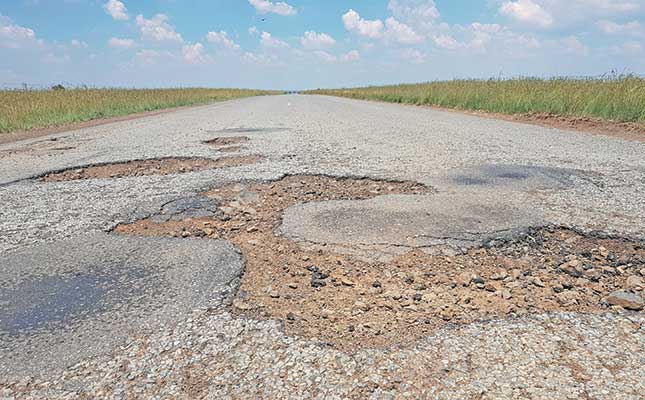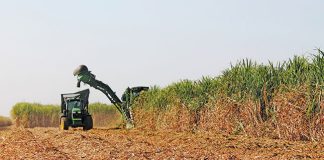
Photo: FW Archive
Roads link food to dining-room tables. The sick to hospitals. Children to schools.
Yet rural South Africans’ lives and livelihoods are under daily threat due to South Africa’s crumbling road infrastructure.
This is according to the results of a survey conducted amongst 311 farming operations, all members of Agri SA or its provincial affiliates, which was delivered to Minister of Agriculture, Land Reform and Rural Development Thoko Didiza in April.
“Roads are the arteries through which the economy pulses. We cannot afford to lock our rural people in cycles of poverty and inequality,” says Lebogang Sethusha, labour and employment specialist at Agri SA.
“We can forget about discussions to accelerate economic growth and job creation when we haven’t invested substantially in the basic foundation of rural infrastructure.”
South Africa has reached a new low, with its unemployment rate at an all-time high. During the fourth quarter of 2021, a staggering 7,9 million South Africans (35,3%) were unemployed. This is the highest unemployment rate since Statistics South Africa started monitoring unemployment rates quarterly in 2008.
However, Sethusha says South Africa cannot truly address the unemployment crisis before the country’s Achilles heel, its dilapidated road infrastructure, has been sorted out. “Roads […] bring life and prosperity to rural communities,” she stresses.
Kulani Siweya, Agri SA’s chief economist, says the survey highlighted that 94% of all agricultural produce is moved by road. “Last year, the average commercial farmer transported around R23 million worth of agricultural produce by road, which comes to a combined total of more than R7,1 billion for South Africa.”
Road repair
Nine out of 10 farmers confirmed that they relied on roads on a daily basis. “This explains why 69% of the respondents had at some point attempted to fix affected roads themselves,” Siweya adds.
The participants revealed that repair costs and related expenses incurred due to poor roads set the average producer back about R200 000 per year.
Christo van der Rheede, executive director of Agri SA, says that noble as their efforts are, it’s not the farmers’ duty to fix roads. They need to focus on food production.
“Over the past year, participants lost 16% of their turnover due to the transportation of produce on bad roads,” he says.
It stands to reason that shoddy roads on which vehicles shake and vibrate will lead to bruised and broken fruit, vegetables and eggs.
Taking government to court
Not a single province has been spared this unfortunate situation. And although policymakers often express sympathy for rural dwellers, it appears that the only road they seem to be attending to is the one paved with good intentions.
It appears that not even a court order helps. In 2015, Agri Eastern Cape dragged Thandiswa Marawu, the then MEC for the Eastern Cape Department of Roads and Public Works, and other government officials to court. On 28 February 2017, Judge Judith Roberson ruled in favour of the organisation.
However, she said that due to a shortage of funds available to the department, roads in the province would always be in a substandard condition (especially due to insufficient gravel levels), and vulnerable to adverse weather conditions.
“The network is in a very poor condition and the vast majority of roads need regravelling in order to restore them to a good condition,” Roberson said, adding that the department was not in a position to perform regravelling activities on the required scale, as it would cost approximately R500 000/km.
“To properly maintain the gravel road network, roads should ideally be regravelled every seven years, which would amount to 5 000km/year, at an annual cost of R2,5 billion. Clearly this is not achievable, as the entire roads budget [for the province] is only R2 billion/ annum. Other activities, such as maintaining and rehabilitating the surfaced roads must surely also be prioritised, even more so,” she said.
Roberson ordered that the department should consult with Agri Eastern Cape over decisions regarding road maintenance. However, Gunther Pretorius, manager of Agri Eastern Cape, says in the years following this verdict, government has not consulted with them once.
Pretorius adds that Agri Eastern Cape, which is at the end of its tether, is contemplating dragging the provincial authorities back to court again.
Jack Armour, commercial manager of Free State Agriculture, says they are also considering taking authorities to court over bad roads.
“When graders do grade the roads, they make berms on both sides of the road, and this turns the roads into storm-water channels when it rains.”
According to him, unmaintained roads are not the only problem faced by Free State farmers. “Blocked culvert pipes are also an issue. Water builds up against the road and eventually flows onto the road, creating very dangerous conditions.”
In Limpopo, farmers have also struggled to get reaction from government. Deidre Carter, CEO of Agri Limpopo, says they have shown photographs and videos of the catastrophic state of the roads to many politicians, to no avail.
“The [state] of the Alldays-Swartwater road (R572) has been highlighted by the Bosveld Farmers’ Association for over a decade.
“Poor road conditions are one of the main reasons why Tiger Brands closed its Alldays depot three years ago. This has subsequently led to a 3 000t drop in tomato production in the region. Many transport companies that have serviced the Bosveld farming community no longer do so,” says Carter.
This is merely one of several roads in the province that are falling apart. Another is the N11, a major route used for the transportation of produce including citrus, cotton, tobacco and grapes. Carter says that farmers are especially concerned about the damage done to export produce.
Potholes and service delivery protests
Life-threatening potholes, uneven road surfaces, poor or no signage, road shoulders lacking gravel, and vegetation blocking lines of vision were the main concerns raised by the farmers of the KwaZulu-Natal Agricultural Union (Kwanalu).
Sandy La Marque, CEO of Kwanalu, says the roads that farmers are most concerned about are of strategic value to the province.
“We’re talking about a main (national) trade route, an agricultural route that leads to mills and carries dairy and feed to and from farms. Furthermore, it’s also a school route, a tourist route and a main commuting route used by businesspeople between towns.”
La Marque says that besides the terrible state of the roads, external factors also hampered farmers’ ability to use the roads.
“We have constant issues with protests due to a lack of service delivery. People don’t receive services with regard to water, housing or roads. Our municipalities are inefficient and we struggle with many councillor issues. Corrupt officials and empty political promises are the order of the day.”
Incompetent officials
Nicol Jansen, chairperson of Agri Northern Cape, says his organisation has been able to establish a good working relationship with the Northern Cape Department of Public Works and Transport. However, the outcome of these engagements still has not had the desire progress.
“The bad state of roads in the province has a highly negative impact on the profitability of the agriculture sector. Transport costs keep on rising, while there’s limited service delivery to the private sector.”
Jansen suspects that many trucks are overloaded, but this cannot be verified as there is only one weighbridge, based in Kimberley, in the province. “And it’s not even working, because vandals broke it!”
He adds that overloaded trucks damage the road badly, and if this isn’t rectified, the situation will only worsen.
“We also need more efficient, dedicated personnel to ensure that we achieve proper service delivery targets. If government employs more ethical workers who are solution-driven, the targets should be reached and problems will be solved. The right workers will stretch the limited budget enormously.”
Email Agri SA at [email protected], or phone 012 643 3400.











